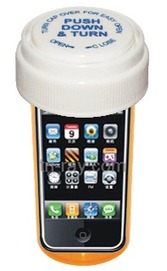A physician’s guide to prescribing mobile health apps
25/10/2014Patients teaching patient safety: the challenge of turning negative patient experiences into positive learning opportunities – BMJ Quality and Safety
25/10/2014A physician’s guide to prescribing mobile health apps
More than one-third of physicians have recommended the use of mobile health apps to their patients in the past year, according to a recent Manhattan Research survey. Experts say that the bulk of these apps are related to diet and fitness, and that few physicians are “prescribing” apps with the expectation of receiving follow-up data. Nevertheless, physicians’ acceptance of mHealth apps and related tracking devices is clearly growing along with mobile’s influence on everyday life.
“The mobile revolution is everywhere around us,” notes Joseph Kvedar, MD, president of the Center for Connected Health (CCH), a unit of Partners Healthcare in Boston. “It’s all about mobile now, and physicians can’t help but notice that, and they feel they have to get involved in some way.”
Mohit Kaushal, MD, a partner in Aberdare Ventures, a San Francisco-based venture capital firm, agrees. “The mobile health world has been around for a couple of years, and we’ve had a lot of experimentation and there are a lot of apps out there,” he points out. “So it’s not surprising that a subset of these apps are quite valuable and that doctors are recommending them.”
On the other hand, Manhattan Research found that only about half of the physicians who recommended apps suggested specific ones to their patients. “Some doctors are going to be more savvy about what apps are around—particularly, younger ones who are more pro-technology,” Kaushal explains. “Those doctors are more likely to prescribe and suggest a particular app.”
With more than 40,000 health-related apps available, most doctors are unsure of which ones to prescribe, notes Kvedar. “There’s a fear of liability if they don’t know what they’re talking about. So they tend to be very general and say, ‘It’s probably worth looking at this category to help you track something because you need to lose 10 pounds or you need to be more active.’”
CCH has a website called Wellocracy.com that rates several trackers and apps. IMS Health has started a much more ambitious project to curate the 16,000 apps in the Apple Store that it considers relevant. A group of experts, in a recent JAMA commentary, proposed that independent or government-commissioned bodies review and certify mHealth apps. But right now, not much is available to help doctors evaluate the effectiveness of mHealth apps before prescribing them to patients.




